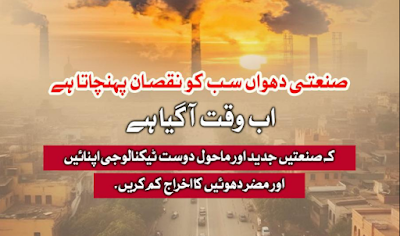Tackling smog situation

Reports suggest that the Punjab government issued various sets of guidelines covering the schools, hospitals and other businesses. Seeing no let-off, it declared state of emergency in Lahore and Multan, calling for closure of schools, special arrangements in hospitals and suspension of construction activities, etc. as the air-quality index (AQI) reading turned furious –setting new records.
Government
and private offices were asked to observe the hybrid system of operations
encouraging 50 per cent of staff to work from home, besides imposing a ban on
night hours working and services in restaurants, restraining transport
movement, cracking down on brick kilns and campaigning against stubble burning
by farmers in fields. The government also held a trial of artificial rain using
technology in selective districts.
In the
meantime, Unicef Pakistan estimated that well-being of about 11 million
children under five was in threat as they were exposed to toxic smog in the
worst affected districts of Punjab. According to it, the impact of this year’s
extraordinary smog will take time to assess but doubling and tripling the
amount of pollution in the air will have devastating effects, particularly on
children and pregnant women.
No doubt, air quality is equally crucial for all sections of people, irrespective of their ages and country or region they lived in. Those breathing well may only think about utilising other amenities and enjoying blessings. Sadly, populations in the developing and under-resourced countries are made to compromise in various walks of life, and environment is no exception to that—as such, “doing more” option could not be ignored totally. There should always be a room for going steadily and steadfast for the sake of young children -- the future of any society aimed at prosperity and sustainable development.
Effects of
smog, climate change or human negligence would remain unaddressed till the time
respective regulators and managers move actively, irrespective of the seasonal
breakouts. Smoke emitted from industry and vehicles and intensive moisture of
atmosphere due to air pollution are also the causes behind smog – a condition
that demand adopting honest administrative and scientific measures and
approaches.
Sooner or
later, this country too have to tackle smog and the related factors
holistically and for all time. The subject of this seasonal hazard needs to be
taken up thoroughly, involving all the stakeholders.
The smog emergencies call for a change in behaviour at all levels in
order to make air quality better. Such a situation in Pakistan too demands
government to facilitate the farmers to adopt scientific methods to remove the
roots of cotton crops, after cutting them, and to sow new crops in order to
avoid smog, which is very harmful to the health of people.
In
addition, our cities are continuously losing the minimum air quality standards,
as the quarters concerned did not place such a daunting public health task on
their priority agenda.
Our
designated environmental protectors and controllers at the Centre and in
provinces are required to rise to the occasion and realign their activities to
prevent further deterioration of air quality, and avert other similar
human health damaging phenomena in future.
Editorial/Social Track, Karachi.




Comments
Post a Comment